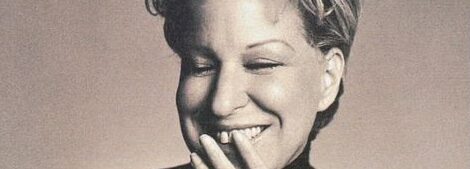Chicago Tribune
Bette Midler – Eyeball to Eyeball
By Tom Hall
Dec. 31, 1972
I SHOULDN’T even have been there that night. I was supposed to be talking to a man who annihilated automobiles at several hundred miles per hour in the fiery back- blast of his jet-propelled racing car. But he had been rained out and left with nothing to talk about, and now I have to face up to Bette Midler.
Bette Midler? The girl who made her mark performing in a Turkish bath?
Me? Who barely Turkish bath towel from a Mister Kelly’s tablecloth?
When it was over, this is what it came down to:
Bette (pronounced -bet”) Mi dler was somebody who came to Chicago and went away-a resolutely-emerging entertainer, still of middling prominence or less. She performed for a couple of weeks at Mister Kelly’s nightclub, where she flounced and sang and maintained an artfully hysterical banter punc- with many great, aspirate sighs. She was worldly and percep- tive and sensitive to cultural moods; she was sardonically ero- tic. to the immense delight of a male homosexual following which had always been more loyal to her than anyone. She was frenetic – a word she particularly treasures: it combines frantic with kinetic. People liked her and paid well to see her and turned their things after she was gone. She probably wouldn’t be back, not for a long, long time.
So it was now or never. I had no business talking to her, but I had committed myself to this. On the night her act opened I had attached myself to the uniquely privileged class that gets invitations from everywhere on opening nights. One of her opening remarks had been directed to us. She had grimaced sweetly and said: “My friends of the freeloading press.”
So it had come to that.
But we only muttered to one another. It was true that we had gotten the best seats in the house, and I had gorged myself on Mister Kelly’s second-best steak and hadn’t paid for it. AU evening I had paid only the gratuity because somebody said that only the cras- sest of freeloaders-those people over there at the other table-didn’t tip. But Bette Midler had made no distinctions. Shehad called us all by the name we didn’t use among ourselves, and we had just growled like cowardly curs.
So, after not having talked to the man who annihilated automobiles, here I was facing Midler. She wasn’t on stage this time; she was supple and well-rested in her second-class hotel suite, and her business agent was in a corner busying himself with paperwork. I wasn’t coping well with her. She was smart. She was tough. And she knew what I really was. She was filled with raw power and could have consumed me with flames at several hundred miles per hour, but she was too decent a person for that. I was grateful to her. I suspected that I liked her!
She had seemed big and – ous on stage, a great, erupting orgy of woman flesh. But now she was surprisingly small: just a little person strung together with taut, tiny tendons. She did have a magnificent and rather startling bosom-it was essential to her act, the seed of the creature she became on stage-but she had a face that was far more interesting. She wasn’t pretty in the least; she was graphic, which was better. She was Jewish, and that too was part of her act. She talked from the middle of the couch, flinging arms and legs this way and that. All chairs were too confining for her.
She was dutifully telling the Turkish bath story; it was a formality always required of her. Once when she needed work she had performed in a men s Turkish bath: not in the steam room itself-the story wasn’t that good-but in an adjoining foyer before all the men wrapped in towels. They were a congregation of homosexuals at ease for the moment in their cloister, and she was bright and hysterical and a little sad. She was perfect for that time and place, and they loved her. They became her most loyal and gratifying audience, and they invited her back again and again. As her career advanced, the Turkish bath had prospered. It had been a grim and tacky place at first, but gradually it had acquired plush carpeting and huge mirrors and a feeling of deep and genuine – ence. She still went there when she needed the reassurance of true friends.
I had been in Seattle,” she said. ‘That was such a sad town. The Boeing plant had laid off all those people, and everybody was out of work. There was a lumber mill or something just polluting every- thing. And it rained all the time. I was in bad when I got out of there, and I came back to the Turkish bath and did some really wild things. I mean I can do things there that I could never do at Mister Kelly’s.”
What things?”
“Well … I tear my clothes off.” “Oh.”
“I love my gay friends,” she said. “They never let me down. They go wherever I go. They pay well. They love me.”
She had been thru this a hundred times. She was playing the game that entertainers play with freeloaders, spinning her character faster than anyone can penetrate it. She was winning the game easily. I was no match for her; I wasn’t even a very good freeloader.
“I am what my audience is,” she said. “You saw my audience at Mister Kelly’s. It was part rich people, part gay. There are poor people who like me too, but they have to catch me on television. I entertain. I bring people together. I say to them: ‘Here I am. You can love me. And I will love you back.’ Then we have a marvelous time.”
She smiled at me. “You probably think that s a lot of crap,” she said.
Well . . .”
“Haven’t you ever been turned on by a performer?” she said with sudden, withering incredulity. “Not ever?”
I’m not sure. I think . .
Well then, has there ever been a performer that you just sort of liked?”
“I used to like. . . Bill Cosby, I guess.” I felt hollow and wretched.
Bill Cosby is great,” she said gently.
I tried to ask something else. I wondered how much money she made at Mister Kelly’s. She said she lived comfortably but wasn’t rich, and I wasn’t really going to ask any more than that, was I? She liked Mister Kelly’s, she said. The Green Goddess salad dressing was good, and the waiters and dish- washers were friendly. She al- ways tried to make friends with the kitchen help because the way to the stage was always thru the kitchen. She encountered her most hostile kitchen crew in a New Orleans hotel. It seemed that Carol Chan- ning had performed there earlier and had refused even to go near the kitchen. Carol had insisted on an alternate route thru lobbies and corridors and had ordered that all common people be cleared out of the way. Bette Midler had to ply her charms on the help for two weeks after that. But they finally talked, she said. They gave her a going- away present when she left.
This wasn’t an easy life, being a performer, she said. She got into it only because she didn’t know any better. She was born and raised in Honolulu and quit college when she was 19 and talented and filled with hope and trust. She went to New York to seek her fortune as an entertainer and had a bad time but survived, which was more than most people did when they tried that.
Now she was 26 and has had as many as 27 accompanists for some acts, and they all reassured her constantly that she was brilliant, and she did the same for them. She looked for all the world like a New York girl and always surprised people when she told them she wasn’t. She was also much wiser now, and if she had to start over she would never attempt any of this.
“There are these people who run things,” she sa.id. “You have no idea what they do to you. The artists all come to them and say: -IÂ have this wonderful, beautiful thing within myself, and I want to give it to the world.’ And these people treat the wonderful, beautiful things like commodities. I was a-commodity. They marketed me like shoes or groceries. They were so calculating and businesslike. I couldn’t be tough enough to survive that. I had to be resilient and keep laughing. And I was lucky – I was awfully lucky. I was a little bit talented too, but that was the least of it. Now I’m doing all right. I keep climbing hills. But I get to the top of one, and there s always another. Nobody ever tells you about all the other hills.”
She wouldn’t come back to Mister Kelly’s. She had been there four times, and the unwritten rule allowed only three. After this she either would continue her resolute emergence until she cost too much to appear in Chicago (except at private affairs like the Housewares or Trucking Association conven- tions) or else her luck and resilience might run out, andeven the Turkish bath would have had enough of her. By then Mister Kelly’s might even be a franchise restaurant-if they turned on the lights inside, it would have the look of a place designed as the prototype for a franchise chain. It didn’t matter, she said. None of it mattered all that much. What she wanted ultimately was to sail away in a large lovely boat with clean. white sails. When everything had become resolved for her, she wanted to go away forever.
“Do you sail boats?” she said. “Yes.”
“Will you teach me?” “I can try.”
“Somebody tried in Seattle. It didn’t work. Somebody tried in Jamaica. We capsized.”
“I used to be the world s best sailing teacher,” I said.
Why did you stop?”
“I had to go to work, become productive. I had been just playing with toys.”
“When I come back to Chicago. you teach me,” she said.
“All right,” I said. I felt much better now.











This is so wonderful.